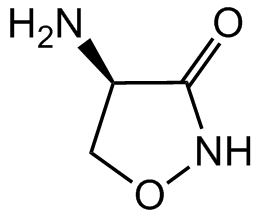
Chemical Structure
D-Cycloserine [68-41-7]
CDX-D0356
CAS Number68-41-7
Product group Chemicals
Estimated Purity>98%
Molecular Weight102.09
Overview
- SupplierChemodex
- Product NameD-Cycloserine [68-41-7]
- Delivery Days Customer2
- CAS Number68-41-7
- CertificationResearch Use Only
- Estimated Purity>98%
- Molecular FormulaC3H6N2O2
- Molecular Weight102.09
- Scientific DescriptionChemical. CAS: 68-41-7. Formula: C3H6N2O2. MW: 102.09. D-cycloserine (DCS) is an antibiotic, inhibiting cell-wall biosynthesis in bacteria. It is a tuberculostatic agent, that inhibits L-alanine racemase and D-alanine:D-alanine ligase, enzymes essential to peptidoglycan synthesis and bacterial cell wall formation. Formulations containing DCS have been used as second-line agents to treat drug resistant tuberculosis. A reason for limited use of this drug is the neurological side effects it causes, since it is able to penetrate into the central nervous system (CNS). DCS acts as a glutamatergic partial N-methyl-D-aspartate (NMDA) agonist. It selectively binds at the glycine-binding site of the NMDA receptor and enable the opening of the NMDA channel. DCS has the ability to improve memory retention in senescence-accelerated mice which exhibit impaired learning and memory. - D-cycloserine (DCS) is an antibiotic, inhibiting cell-wall biosynthesis in bacteria. It is a tuberculostatic agent, that inhibits L-alanine racemase and D-alanine:D-alanine ligase, enzymes essential to peptidoglycan synthesis and bacterial cell wall formation. Formulations containing DCS have been used as second-line agents to treat drug resistant tuberculosis. A reason for limited use of this drug is the neurological side effects it causes, since it is able to penetrate into the central nervous system (CNS). DCS acts as a glutamatergic partial N-methyl-D-aspartate (NMDA) agonist. It selectively binds at the glycine-binding site of the NMDA receptor and enable the opening of the NMDA channel. DCS has the ability to improve memory retention in senescence-accelerated mice which exhibit impaired learning and memory.
- SMILESO=C1NOC[C@H]1N
- Storage Instruction-20°C,2°C to 8°C
- UNSPSC12352200


![D-Cycloserine [68-41-7]](https://www.targetmol.com/group3/M00/02/A7/CgoaEGY7OeSELedbAAAAAFjxJa0955.png)